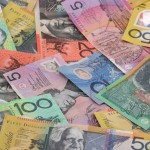Yen Weakens Third Day as BOJ Maintains Easing; Aussie, Kiwi Gain

The yen fell for a third day against the dollar as the Bank of Japan maintained unprecedented stimulus that has seen the exchange rate decline for five straight months.
Japan’s currency fell at least 0.3 percent versus all 16 major counterparts as a rally in Asian stocks sapped demand for safety. The Australian and New Zealand dollars strengthened after China revised up the size of its economy, the two nations’ largest trading partner. The U.S. currency headed for a weekly gain on the outlook for higher interest rates. A measure of foreign-exchange volatility increased for a fourth week.
“A central bank that seems very willing to turn a blind eye to the potential negative implications of a rapid depreciation in the yen, that to me is a recipe for 130” per dollar in the second half of 2015, said Robert Rennie, head of currency and commodity strategy at Westpac Banking Corp. in Sydney. “Financial markets are trying to sound the all clear,” reducing demand for the yen as a haven.
The yen dropped 0.4 percent to 119.30 per dollar as of 2:41 p.m. in Tokyo after weakening 2 percent during the previous two days. Japan’s currency declined 0.4 percent to 146.52 per euro. The dollar was little changed at $1.2281 per euro.
The Bank of Japan will boost its monetary base at an annual pace of 80 trillion yen ($672 billion), it said in a statement after a meeting in Tokyo, a decision forecast by all 33 economists surveyed by Bloomberg News. The economy is expected to continue a moderate recovery as the effects of an April sales-tax increase dissipate, the BOJ said.
Yen’s Slump
The yen has slumped 8.5 percent against the dollar since Oct. 30, the day before the central bank unexpectedly boosted stimulus to try to help the economy emerge from recession.
The currency also weakened today as the MSCI Asia Pacific Index (MXAP) of shares gained 1.7 percent.
Australia’s dollar advanced for a second day as the results of a Chinese nationwide economic census showed gross domestic product of the world’s second-largest economy was 58.8 trillion yuan ($9.45 trillion) in 2013. That’s 3.4 percent larger than the previously reported figure.
Australian shipments to China accounted for $142 billion last year, almost double the amount sent to Japan, the second-largest destination.
The Aussie gained 0.2 percent to 81.85 U.S. cents after appreciating 0.5 percent yesterday. New Zealand’s kiwi rose 0.4 percent to 77.93 U.S. cents.
Dollar Index
A gauge of the U.S. dollar headed for its eighth weekly gain in the past nine weeks after the Federal Reserve signaled at its Dec. 16-17 policy meeting that it was on course to raise interest rates next year.
Talking to reporters after the meeting, Fed Chair Janet Yellen laid out the economic parameters that would need to be met for liftoff to begin later in the year and said rates probably would be raised gradually thereafter.
The Bloomberg Dollar Spot Index, which tracks the U.S. currency against 10 major peers, climbed 0.1 percent to 1,122.36, having risen 0.6 percent this week.
The dollar has strengthened 12 percent in 2014, the best performer of 10 developed-nation currencies tracked by Bloomberg Correlation-Weighted Indexes. The euro fell 1.5 percent and the yen weakened 2.9 percent.
JPMorgan Chase & Co.’s Global FX Volatility Index climbed 40 basis points this week to 10.05 percent after reaching 10.12 percent yesterday, the highest since September 2013. It has risen from a record-low 5.28 percent set in July.
“Volatility for currency markets continues to rise,” said Camilla Sutton, chief foreign-exchange strategist at Bank of Nova Scotia in Toronto. “We’re seeing large flows pushing around the major currencies less on fundamentals and more on liquidity and risk aversion.”
Source: Bloomberg – Yen Weakens Third Day as BOJ Maintains Easing; Aussie, Kiwi Gain





























